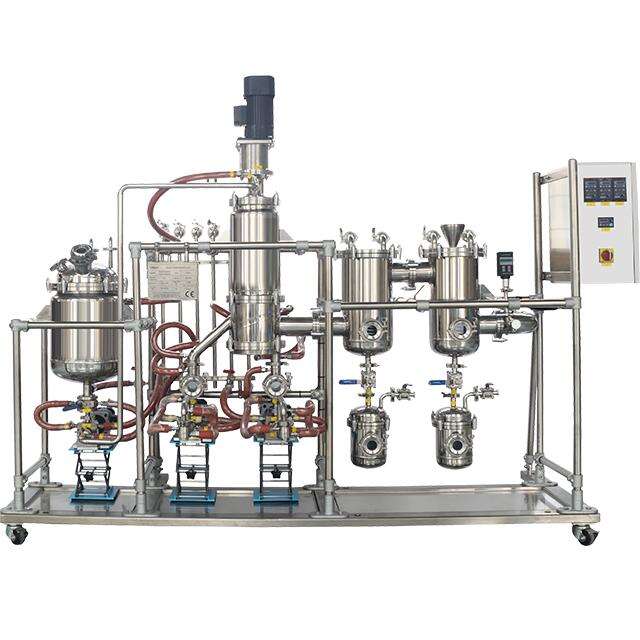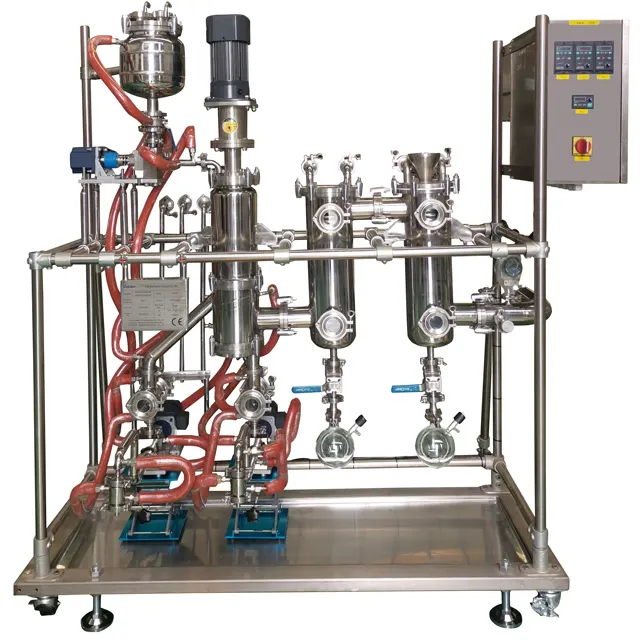ワイプフィルム分子蒸留の基礎
基本原理と作動機構
ワイプフィルム分子蒸留は、熱に弱い成分を損なうことなく複雑な混合物を分離するという非常に高度な方法として注目されています。その基本的な考え方は、加熱された表面領域に液体の薄層を形成することにあります。こうした工程では、特殊なワイパーが均一に液体を広げることで、十分な熱暴露を受けさせ、適切に蒸発させることが可能になります。この方法が効果的に機能する理由は、圧力差と分子運動速度との相互作用によって分離が行われる点にあります。より軽い分子は減圧時に速く移動するため、最初に蒸発して飛び去りやすくなります。このような理由から、この技術は熱に敏感な物質や高粘度液体を扱う製造業者において広く利用されるようになっており、通常の方法では対応が難しい物質の処理にも適しています。
高真空運転:沸点の低下
真空条件はワイプフィルム分子蒸留プロセスにおいて重要な役割を果たします。これは、沸点を大幅に低下させ、従来の方法よりもはるかに低い温度で異なる化合物をより効果的に分離できるようにするためです。減圧状態ではシステムに投入するエネルギーが少なくて済むため、熱に敏感な材料を処理中に分解することなくその構造を保持することが可能になります。多くの産業用装置は1パスカルを大きく下回る圧力で運転され、これは物質どうしがどれだけ効果的に分離されるか、そして最終的な製品純度に大きく影響を与えます。最適な真空パラメーターを適切に設定すれば、揮発性成分は迅速に蒸発し、凝縮面で効率的に回収されるため、複雑な混合物を扱う場合でも一貫した高品質な製品を得ることが可能になります。
ショートパス設計:滞留時間の最小化
短距離設計を備えたワイピングフィルム蒸留システムは、熱に弱い化合物を過剰な熱暴露から保護するのに役立ちます。蒸発面と凝縮ゾーンの距離が数センチメートル程度に維持されると、材料がシステム内に存在する総時間が短縮されます。これにより、劣化や熱損傷を受ける可能性が少なくなり、自然と最終製品の純度が高まります。医薬品製造のように、有効成分を保持することが極めて重要になる場面を考えてみてください。このような設計の特徴が、まさに重要となる場面です。短距離方式のワイピングフィルム分子蒸留は特に有効であり、さまざまな業界の製造プロセスにおいて、タイミングが重要な分離を正確に行うことができます。
熱に敏感な化合物のための熱保護
微細分子における熱分解の防止
化学物質を扱う際、熱はもろい分子にとって非常に厄介で、敏感な化合物が分解してさまざまな問題を引き起こす原因となります。ビタミンや医薬品、あるいは高温にまったく耐えられないさまざまな有機物質などが挙げられます。このような場合に役立つのがワイプドフィルム蒸留です。この方法は、温度を慎重に制御し、加熱の強さを制限する仕組みを採用しています。装置内では加熱面に極めて薄い層が形成され、熱が均等に行き渡るようになっています。この構造により、貴重な化合物が過剰な熱で損傷を受けるリスクを実際に軽減します。研究室や製造現場では、処理速度を速めながらも低温でプロセスを行うことで、物質の質を保つうえで大きな違いを生み出しています。そのため、貴重な分子構造を扱う人にとっては、この技術は化合物をプロセス中に保持するために非常に重要なものとなっています。
化合物の完全性を保持するためのメカニズム
ワイプフィルム分子蒸留技術は、特に分解しやすいデリケートな材料において、処理中に化合物を安定した状態に保つために非常に効果を発揮します。この方法が効果的である理由として、主に2つの要素が挙げられます。第一に、不活性ガスで満たされた環境を作り出し、酸化による損傷を防ぐシールドのような役割を果たします。第二に、システム全体での温度変化を慎重に管理し、特定の部分が過熱されることなく、すべての部分が均一に熱を受けるようにしています。この方法に関する研究からは、蒸留後に得られる化合物は他の方法と比較してはるかに品質が保持されていることが明確に示されています。このプロセスにより、化合物の劣化問題がほぼすべて抑制され、貴重な機能的特性が維持されるため、多くの研究室や製造業者が化学製品において最も重要となる部分を保持するためにワイプフィルム蒸留法を定番の方法として採用しています。
ケーススタディ: カンナビノイドの保存
植物由来のカンナビノイドを抽出する際、ワイプドフィルム蒸留がいかに優れているかをご覧ください。従来の方法では、これらのデリケートな化合物が処理中に破壊されたり劣化したりする傾向がありますが、ワイプドフィルム方式では、ほとんどの治療効果を維持することができます。最近、医薬品および健康補助食品の市場において、純粋なカンナビノイド単離物に対する依頼が急増しています。これは、それらの潜在的な健康効果に関する最近の研究結果を考えれば当然です。高品質の製品を製造し、その効力までも損なわないようにしたい企業にとっては、現在ではワイプドフィルム分子蒸留装置は必要不可欠なものとなっています。カンナビノイドの価値を最初に生み出すその維持能力において、この方法は間違いなく他を圧倒しています。
従来の方法に対する重要な利点
強化型 製品 安定性と有効成分の保持能
ワイプフィルム分子蒸留は、製品の安定性と有効性を維持する点で非常に優れており、敏感な化合物に対しても長い賞味期限を実現します。伝統的な方法はこの高度な方法と比較して劣っており、熱によって材料が分解されがちですが、ワイプフィルムは物質を保持したままでいられます。処理を行う実験室での結果を見ると、その差は明らかです。ワイプフィルムで製造された製品は、一般的な蒸留装置で作られたものと比べて、より高い有効性を維持します。これは現実の数値でもあり、多くの製造業者が従来の方法を大きく上回る有効性の数値を報告しています。なぜなら、ワイプフィルムは蒸発過程において熱によるダメージが少なく、より精密な管理が可能で、繊細な配合において品質を保つための最適な選択肢だからです。
高純度用途における汚染防止
ワイプフィルム蒸留は、非常に高い純度が求められる物質を扱う際に重要な、交差汚染の大幅な削減が可能な点で優れています。この方法が効果的なのは、不純物を除去して目的の物質を精製する際の分離能力が非常に高いからです。他の多くの蒸留装置では不純物を分離しきれませんが、ワイプフィルム蒸留はその点で優れています。実際の実験室での結果を確認すると、伝統的な方法と比較して最終生成物がどれほど清浄であるかがわかります。研究者による繰り返しの試験でも、不純物レベルが一貫して低く抑えられていることが確認されています。そのため、製薬会社や半導体メーカーは、純度や品質管理において厳格な基準を満たす材料を必要とする際に、ワイプフィルム技術を強く頼りにしています。
複雑な混合物に対する優れた分離効率
ワイプフィルム分子蒸留は、複雑な混合物を分解する際に優れており、ほとんどの従来の方法よりも優れた分離性能を提供します。この技術が厄介な物質の純化に非常に適しているのはなぜでしょうか?その設計が蒸留プロセス中に実際に賢く作動するからです。ワイプフィルム技術が他の方法では処理できなかった複雑な混合物を綺麗にした実際の事例を見てみましょう。産業用ラボでは、ワイプフィルム技術が古い技術よりもどれほど優れているかを示す詳細なケーススタディによってこれらの成功が記録されています。非常に純度の高い結果が必要な複雑な化合物を扱う際には、この方法が特に効果を発揮します。多くの製造業者が現在、医薬品や特殊化学品において極めて重要な高純度レベルを一貫して実現できるため、ワイプフィルムを頼りにしています。
熱に敏感な産業における応用
エッセンシャルオイル:テルペンおよび香りの保持
ショートパスワイピングフィルム蒸留は、貴重なテルペンとその特徴的な香りを保持するという点で、精油製造のあり方を一変させました。この技術の特筆すべき点は、熱に敏感な成分を分解することなく分離できるため、精油が本来持つ香りの強さや特徴を維持できることです。実際の試験結果からも、従来の方法がこうした繊細な成分に影響を与えることが多いのに対し、ワイピングフィルム分子蒸留はテルペンプロファイルをはるかに良好に保持する能力があることが示されています。現在の市場動向を眺めると、天然由来の抽出物に対する関心が高まっています。消費者は今、人工的に香りを強調されたものよりも、純粋で本物の香りを持つ製品を求めています。このような純度志向の流れが、製造各社に優れた抽出技術の導入を促しているのです。
劣化を伴わないビタミン濃縮
ワイプフィルム分子蒸留は、ビタミンの抽出および濃縮において特に優れており、通常の蒸留技術でよく起こるビタミンの分解を実際に防ぐことができます。このプロセスでは、精製工程全体を通してビタミンが保持されます。なぜこれほど効果的なのかというと、主に2つの理由があります。まず、従来の方法と比較して、このシステムははるかに低い温度で運転され、また2つ目に、作業がより迅速に完了します。このような条件により、熱や酸素との接触によって敏感なビタミンが損傷することを防ぐことができます。実験室での研究では、これらのシステムが古い方法と比較して最大30%も多く活性成分を保持できることが示されており、栄養価を重視する製造業者にとって製品品質に大きな違いをもたらしています。
医薬用途のカンナビノイド精製
医療用製品を製造する際に、医薬品グレードの純度レベルまでカンナビノイドを精製することは極めて重要です。ワイプドフィルム分子蒸留法は、規制内での運用を維持しながらこれらの基準を達成するための最良の方法の一つとして際立っています。基本的にこの方法は、カンナビノイドをあらゆる不要物質から分離し、厳格な純度要件を満たす物質を残します。国内の実際の研究施設で何が行われているのかを見てみると、多くの製造業者がこの方法に依存しています。これは、この方法が保健当局が設定した最も厳しい試験基準さえも満たす品質のカンナビノイドを一貫して生み出しているからです。企業が確立された純度基準に厳密に従って製造を行えば、患者は信頼できる治療法を得ることができ、規制機関もカンナビノイドベースの医薬品を広く流通させるための承認に対して安心感を持つことができます。
各段落では、ワイプドフィルム分子蒸留が熱に敏感な産業分野において、製品の重要な特性を保持しながらより高い純度レベルを達成することで、従来の蒸留技術を上回る大きな利点を示しています。

工業プロセスにおける運用上の利点
高粘度および詰まり性材料の取り扱い
粘度が高く、ねばねばした素材の取り扱いは、標準的な蒸留方法において常に頭痛の種でした。これは主に、素材がこびりついてしまうことや処理速度が遅いといった問題によるものです。ワイプドフィルム分子蒸留法は、薄い層を常に撹拌しながら処理する独自の構造により、この問題をはるかに効果的に解決します。この方法が非常に効率的に機能する理由は、運転中も加熱面が常に清潔に保たれ、厄介な堆積物が大幅に減少するため、産業用ポリマーや樹脂混合物のような非常に粘稠な物質の処理も可能になる点です。化学メーカーおよび製薬会社では、この手法の導入が進んでおり、これまで通常の条件下では取り扱いが難しく、長年苦労していた頑ななな素材に対する解決策を見出しています。
連続処理におけるエネルギー効率
エネルギー消費は多くの製造業界において依然として大きな課題であり、特に連続式プロセスとバッチ式プロセスの比較において顕著です。ワイプフィルム分子蒸留法は、材料を短時間接触させるだけでなく、はるかに低温で動作するため、他とは一線を画しています。この手法がこれほど価値があるのはなぜでしょうか?それは処理中に熱に敏感な成分の分解を防ぎながら、大幅に電力需要を削減するからです。このシステムに切り替えた後、工場によっては電気料金が約30%削減されたと報告しており、長期的には大きな節約につながります。さらに、環境面でも明らかな利点があります。多くの化学工場や食品加工業者では、この切り替えにより、予想外の形で経済的および生態学的な利益が得られているのです。
ラボから生産へのスケーラビリティ
ワイプフィルム分子蒸留は、実験室での作業から産業用の生産ラインまで、容易にスケールアップできるため際立っています。この技術の特徴は、運用規模が変わっても性能基準と製品品質を維持する能力にあります。多くの化学プロセス企業がこの方法を採用し、研究開発ラボでの小規模バッチ実験からほんの数ヶ月で大量生産施設へと移行することに成功しています。経済的な観点から見ても、ここには明確な価値があります。企業がワイプフィルムシステムを利用して生産能力を高めることで、大規模な注文に対応できるだけでなく、より大量のバッチにおいても製品の一貫した純度を保つことが可能です。これは、ごくわずかな不純物によって何千ドルもの出荷分が台無しになる恐れのある業界において特に重要です。
よくある質問セクション
ワイプフィルム分子蒸留とは何ですか?
ワイプフィルム分子蒸留は、加熱面上に薄膜を形成して迅速な蒸発を促進することにより、複雑な混合物、特に熱に敏感で高粘度の材料を処理するために用いられる分離技術です。
高真空運転は蒸留においてどのように効果を高めますか?
高真空運転により沸点が大幅に低下するため、低い温度で化合物を効率的に分離でき、エネルギー消費を最小限に抑えながら温度に敏感な材料の特性を保持します。
ショートパス設計が重要な理由はなぜですか?
ショートパス設計は蒸発領域と凝縮領域の距離を最小限に抑えるため、熱暴露を軽減し、薬品などの用途において重要な敏感な化合物の劣化を防ぎます。
ワイプフィルム蒸留は熱に敏感な業界にどのような利点がありますか?
ワイプフィルム蒸留は、エッセンシャルオイルやビタミン、カンナビノイドなどの熱に敏感な業界において、高純度を維持し劣化を防ぐことで製品の基本的な特性を保持します。
ワイプフィルム蒸留はエネルギー効率が良いですか?
はい。ワイプフィルム蒸留は低温度での運転および滞留時間が短いことからエネルギー効率が良く、エネルギー消費を削減し、熱による劣化を最小限に抑えることができます。

